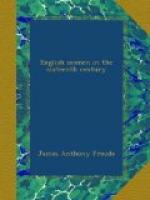Philip liked his modesty; but in fact the Duke’s defects were his recommendations. He would obey his instructions, would not fight unless it was necessary, and would go into no rash adventures. All that Philip wanted him to do was to find the Prince of Parma, and act as Parma should bid him. As to seamanship, he would have the best officers in the navy under him; and for a second in command he should have Don Diego de Valdez, a cautious, silent, sullen old sailor, a man after Philip’s own heart.
Doubting, hesitating, the Duke repaired to Lisbon. There he was put in better heart by a nun, who said Our Lady had sent her to promise him success. Every part of the service was new to him. He was a fussy, anxious little man; set himself to inquire into everything, to meddle with things which he could not understand and had better have left alone. He ought to have left details to the responsible heads of departments. He fancied that in a week or two he could look himself into everything. There were 130 ships, 8,000 seamen, 19,000 Spanish infantry, with gentlemen volunteers, officers, priests, surgeons, galley slaves—at least 3,000 more—provisioned for six months. Then there were the ships’ stores, arms small and great, powder, spars, cordage, canvas, and such other million necessities as ships on service need. The whole of this the poor Duke took on himself to examine into, and, as he could not understand what he saw, and knew not what to look at, nothing was examined into at all. Everyone’s mind was, in fact, so much absorbed by the spiritual side of the thing that they could not attend to vulgar commonplaces. Don Quixote, when he set out on his expedition, and forgot money and a change of linen, was not in a state of wilder exaltation than Catholic Europe at the sailing of the Armada. Every noble family in Spain had sent one or other of its sons to fight for Christ and Our Lady.
For three years the stream of prayer had been ascending from church, cathedral, or oratory. The King had emptied his treasury. The hidalgo and the tradesman had offered their contributions. The crusade against the Crescent itself had not kindled a more intense or more sacred enthusiasm. All pains were taken to make the expedition spiritually worthy of its purpose. No impure thing, specially no impure woman, was to approach the yards or ships. Swearing, quarrelling, gambling, were prohibited under terrible penalties. The galleons were named after the apostles and saints to whose charge they were committed, and every seaman and soldier confessed and communicated on going on board. The ship-boys at sunrise were to sing their Buenos Dias at the foot of the mainmast, and their Ave Maria as the sun sank into the ocean. On the Imperial banner were embroidered the figures of Christ and His Mother, and as a motto the haughty ‘Plus Ultra’ of Charles V. was replaced with the more pious aspiration, ‘Exsurge, Deus, et vindica causam tuam.’




